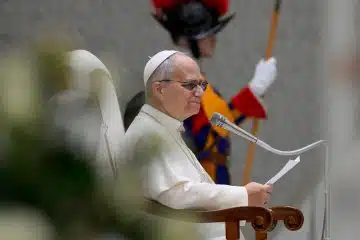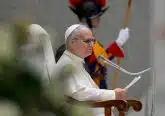On plans for a ‘new Middle East’ without the Palestinian people
By Andrea Tornielli
The Israeli–Palestinian conflict has long been a source of debate and polarization. The war now raging in Gaza, and the controversies surrounding it, have made this phenomenon even more extreme, if that were possible.
Intense—at times extreme—polarizations run through much of civil society in many countries around the world. As always, there is no shortage of manipulation, simplification, and approximation which, in such a complex context, risk misleading and doing harm.
This can be seen in the language used, in an extremely emotional approach, and in the inability to try to listen to the other.
In response to the horror of what happened nearly two years ago—the attack carried out by Hamas, which remains an inhuman act of terrorism to be condemned without any reservation—there followed a predictable Israeli reaction.
It has been a disproportionate reaction, going well beyond any ethically acceptable limit, as recognized not only by numerous international authorities but also by many voices within Israel itself and more broadly within the Jewish world.
If we analyze the war unleashed in Gaza while taking into account what is happening in the rest of Palestine—what was once called the West Bank—we cannot but think that, beyond the response to the massacre of October 7, there are other objectives as well.
The expansion of settlements, the continual and unpunished assaults by settlers, the public statements of some Israeli government ministers who hope for the end of the Palestinian Authority, the annexation of all the territories, and the deportation of Palestinians all lead one to think that the objective goes far beyond the elimination of Hamas or the guarantee of security for the State of Israel.
In recent days, a new settlement has been approved in the E1 area, which practically splits that territory in two. Likewise, there is talk of annexing Area C of the Palestinian Territories, which, moreover, is already under full Israeli control without ever having been formally annexed.
In this increasingly tense context, “plans” for a “new Middle East” are being published one after another—first quietly and now ever more openly—a kind of new order in which, however, there seems to be no place for the Palestinian people.
The latest of these is the plan now being discussed for the future development of Gaza. It envisions the construction of “smart” cities and luxury resorts.
Naturally, it provides for what is tellingly called the “voluntary evacuation” of Palestinians, who—if they wish—may one day return (sic!). And for those who do not want to leave, “special zones” are being designed… It is a plan that speaks for itself. One might have thought it was a work of science fiction, the plot of a fantasy film. Instead, it is—so it seems—sadly real.
It is sorrowful to note the weakness of the international community and multilateral bodies, unable to halt this drift, compounded by the deliberate ignoring of international conventions, respect for rules, and moral conduct. The only language left is that of force—first in words and then in military action.
The Church has no weapons and no power to impose anything. Her only weapon is prayer and the strength of the Gospel, which nevertheless compels us to speak a clear word of truth about the human person and about the life of the world.
No future can be built on force, on contempt for human life, or on the refusal of people’s aspiration to a dignified and secure existence.
We desire this—and we repeat it with conviction—for Israelis, continuing to call for the immediate release of all hostages still trapped in the tunnels of Gaza, as Pope Francis and then Pope Leo XIV have done in their appeals.
We desire it equally for Palestinians. We ask that the hostages be treated in a dignified and humane way, and at the same time that Palestinians in Gaza be treated in a dignified and humane way.
We hope that no-combat zones will be established throughout the Gaza Strip—true safe zones under international protection—where the sick, the vulnerable, and unarmed civilians can find shelter.
“Voluntary evacuations,” that is, forced displacement; total destruction; endless deaths; hospitals struck; daily killings of those standing in line for a crust of bread; the blocking of any clear political horizon that would give the Palestinian people dignity and a home in their own land—these will never build the future balance of the Middle East.
What is happening is, sadly, destined to create the next generation of people filled with hate and risks becoming yet another antechamber to yet another future wave of violence.
Certain development proposals that impose on Palestinians a future decided for them—and perhaps also over them, or worse, against them—are nothing but further proof of arrogance and blindness. The future of the Palestinians can and must be decided only together with them, never without them.
The Church, as she is already doing, will continue to bend down to bind the wounds of all.
She will continue to extend her hand to all who are willing to work together to create alternative contexts of life and dignity. Her doors will always remain open to those who refuse to surrender to the logic of hatred and war, and who seek practicable paths to peace.
For several years now, the Holy See has formally recognized the State of Palestine, and we cannot remain silent in the face of what is happening.
Once again we make Pope Leo XIV’s words our own, asking that the barbarity of war be stopped, that a peaceful solution to the conflict be reached, that humanitarian law be observed, that the obligation to protect the civilian population be respected, and that collective punishment, the indiscriminate use of force, and the forced displacement of the population be prohibited.













